What Happens If You Only Drink Water For 3 Days?
Discover the science-backed benefits that happen in just 72 hours - plus critical safety tips
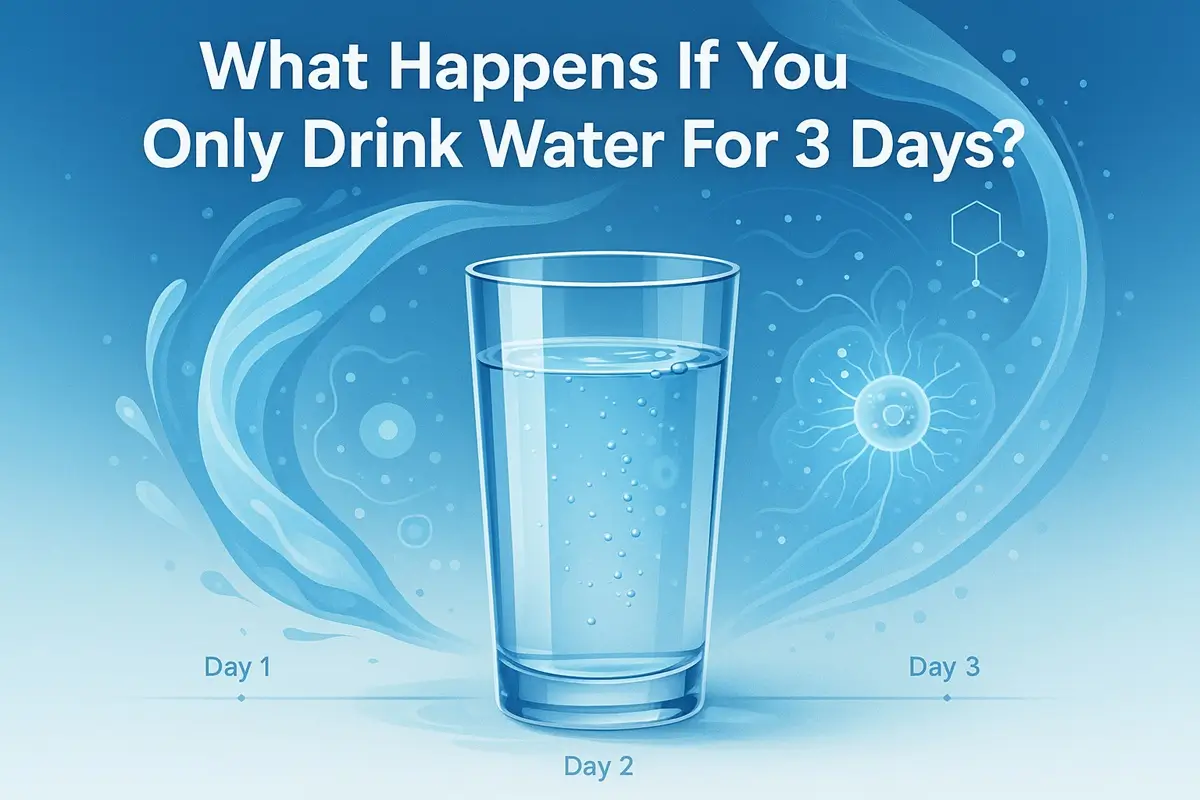
Can drinking only water for three straight days actually reset your metabolism and regenerate your cells? Recent scientific studies suggest the answer might be yes – but with important caveats that could make the difference between healing and harm.
What happens if you only drink water for 3 days is more complex than most people realize. Your body undergoes dramatic metabolic shifts that can produce powerful health benefits, but also carries risks that demand careful consideration.
This article examines the latest research to provide you with a complete, science-backed guide to everything you need to know about 72-hour water fasting.
What Is A 3 Day Water Fast?
Water fasting means consuming nothing but plain water = no food, no beverages, no calories of any kind for the specified period. During a 3-day water fast, you’ll typically drink 2-3 liters of water daily while avoiding all solid foods and caloric drinks [1].
This practice differs significantly from intermittent fasting or modified fasting approaches. We’re talking complete caloric restriction for 72 consecutive hours.
Historical records show various cultures have used extended fasting for spiritual and health purposes for thousands of years, but modern medicine is just beginning to understand the precise mechanisms at work.
A 3-day water fast is a process where you consume only water for a total of 72 hours, eliminating all other food and drink from your diet – not even non-caloric beverages like green tea or black coffee.
Hour-by-Hour: A Detailed Timeline of What to Expect
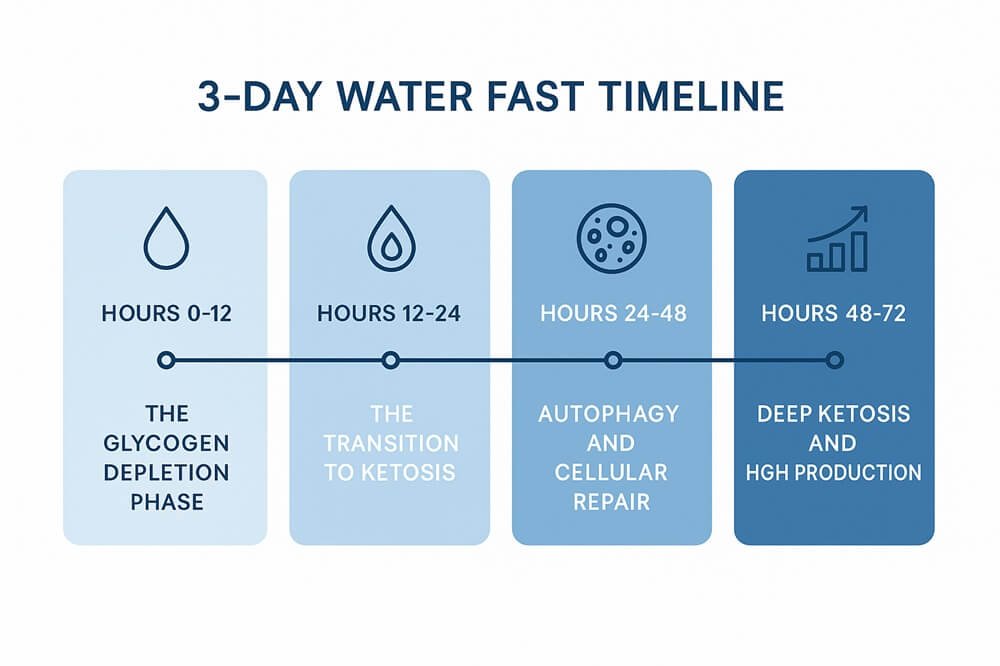
Hours 0-12: The Glycogen Depletion Phase
Your body starts this journey by burning through its stored glucose, called glycogen. Think of glycogen as your body’s checking account = easily accessible energy stored primarily in your liver and muscles. Most people have about 1,500-2,000 calories worth of glycogen reserves.
During these first 12 hours, you’ll likely feel relatively normal. Hunger pangs may come and go, but they’re usually manageable. Your blood sugar remains stable as your liver releases glucose from glycogen stores.
Hours 12-24: The Transition to Ketosis
This is where things get interesting. Once your glycogen runs low, your body flips what scientists call “the metabolic switch” [2].
Your liver begins breaking down fatty acids into ketones = an alternative fuel source that can power your brain and organs.
You might experience some fatigue, mild headaches, or irritability during this transition. (“Why do I feel so blah?” you might wonder.) These symptoms typically indicate your body is successfully shifting from glucose to fat burning.
Hours 24-48: Autophagy and Cellular Repair
By day two, something remarkable happens at the cellular level. Your body ramps up autophagy = a process where cells literally digest their own damaged components and recycle the parts.
MIT researchers recently discovered that this cellular cleanup intensifies significantly during prolonged fasting [3].
Blood ketone levels typically reach 2-4 mmol/L during this phase, providing steady energy to your brain. Many people report improved mental clarity once they push through the initial discomfort.
Hours 48-72: Deep Ketosis and HGH Production
The final day brings peak metabolic changes. Ketone production reaches its highest levels, often exceeding 4-5 mmol/L in healthy individuals. Growth hormone levels can spike by 300-500%, potentially supporting muscle preservation and cellular repair processes [4].
Research from Queen Mary University of London found that most metabolic benefits of fasting peak around the 72-hour mark, with diminishing returns beyond three days [5].
What Happens If You Only Drink Water For 3 Days?
Here are the most definite changes in your body that you would notice if you replace each of your beverages with water for 3 days.
1. Cellular Cleanup (Autophagy)
Scientists have identified autophagy as one of fasting’s most promising benefits. Autophagy, a Greek term meaning ‘self-eating,’ is a cellular process that breaks down and recycles old, potentially harmful parts of cells. This process is crucial as it helps to maintain overall cell health and functionality.
It basically allows your cells to remove damaged proteins, dysfunctional organelles, and cellular debris that accumulates over time.
Studies show autophagy markers increase dramatically after 24-48 hours of fasting. While most research has been conducted in animal models, emerging human studies suggest similar mechanisms are at work [6].

2. Metabolic Health
A comprehensive review of prolonged fasting studies found consistent improvements in insulin sensitivity and blood glucose control. Participants typically experienced 65-80% reductions in fasting insulin levels after 3-5 days of water fasting [7].
These changes can persist for several weeks after breaking the fast, particularly when combined with dietary modifications during the refeeding period.
3. Potential for Weight Loss
Let’s be real about the numbers. Most people lose 3-7 pounds during a 72-hour water fast, but roughly two-thirds of this initial loss comes from water weight and lean mass, not fat [8].
True fat loss during a 3-day fast typically ranges from 0.5-1.5 pounds. While the scale might show impressive drops, sustainable fat loss requires longer-term dietary changes.
4. Brain Health and Mental Clarity
Ketones provide an efficient fuel source for brain cells. Many fasters report heightened focus and mental clarity by day 2-3, though this varies significantly between individuals.
Research suggests ketones may have neuroprotective properties, but most studies examining cognitive benefits have focused on longer fasting periods or ketogenic diets rather than short-term water fasts [9].
5. Gut Rest and Digestive Reset
Giving your digestive system a complete break allows inflammation in the intestinal lining to subside. However, recent MIT research revealed an important nuance: the regenerative benefits occur primarily during the refeeding phase, not during the fast itself [10].
6. Human Growth Hormone (HGH)
An interesting effect of only drinking water for three days is the increased secretion of your body’s human growth hormone (HGH). [11]
This hormone, produced by your pituitary gland, plays a crucial role in growth, body composition, cell repair, and metabolism.
The pituitary gland is a tiny thing at the bottom of your brain. It makes a bunch of hormones that help your body do stuff like grow, handle stress and make babies. It’s also called the master gland because it tells other glands what to do.
It’s also instrumental in increasing muscle mass and strength, and it contributes to the health of your heart and bones.
When you fast, your body seeks ways to conserve energy and maintain functionality. To do this, it triggers a surge in HGH production.
This hormone boost helps maintain muscle and lean tissue mass, aids in fat burning, and facilitates cell repair. It’s a survival response that keeps your body efficient while you’re not taking in food.
7. Reduces bad cholesterol (LDL) and triglycerides
In addition to the remarkable revitalization of your cells and increasing your HGH, your body’s management of bad cholesterol and triglycerides also sees significant improvement when you solely consume water for three days.
Medically supervised water fasts have been shown to positively influence levels of LDL cholesterol, commonly referred to as the ‘bad’ cholesterol. [12]
This substance, when in excess, can build up in your blood vessels, leading to heart disease.
Likewise, high levels of triglycerides, a type of fat found in your blood, can increase your risk of stroke. A three-day water fast can help lower these levels, reducing your risk of cardiovascular conditions.
Therefore, drinking only water for an extended period can be a proactive step towards improved heart health.
Related: 24 Best Foods for Lowering Cholesterol (Fact Checked)
Is a 3 Day Water Fast Safe?
Despite the potential health benefits, you shouldn’t underestimate the risks associated with a 3-day water fast.
It’s important to understand that this practice should only be undertaken under medical supervision due to its potential adverse health effects. Prolonged fasting can lead to dehydration, muscle loss, and nutritional deficiencies. Of particular concern is the risk of refeeding syndrome, a potentially fatal condition that can occur if your body undergoes rapid changes in fluid and electrolyte levels after a water fast.
So, Who Should NOT Attempt a 3-Day Water Fast?
Several groups should avoid water fasting entirely:
- Pregnant or breastfeeding women
- Children and adolescents under 18
- People with eating disorders or history of disordered eating
- Individuals with type 1 diabetes
- Those with advanced kidney disease (eGFR < 60)
- People taking medications that require food intake
- Anyone with a history of cardiac arrhythmias
- Individuals with low blood pressure or orthostatic hypotension
- Individuals with gout, diabetes, eating disorders, as well as older adults, pregnant women, and children should veer away from water fasting.
(Ed. note: This list isn’t exhaustive. Always consult a healthcare provider before attempting any extended fast.)
Common Side Effects and How to Manage Them
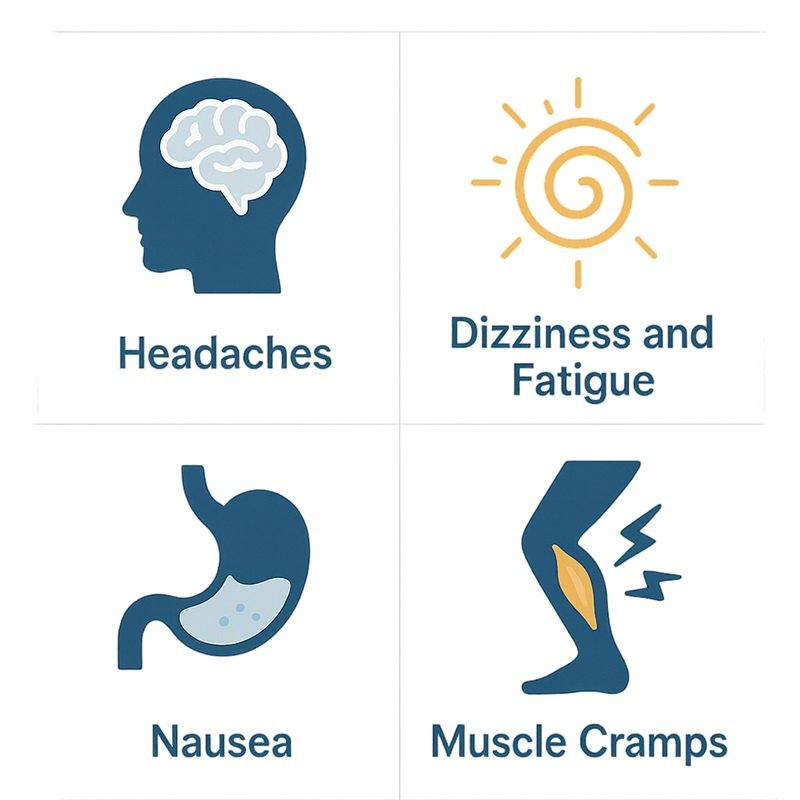
- Headaches – Approximately 60-70% of first-time fasters experience headaches, typically starting 12-24 hours into the fast. These often result from caffeine withdrawal, dehydration, or electrolyte imbalances. Management: Increase water intake and consider adding a pinch of sea salt to your water.
- Dizziness and Fatigue – Blood pressure commonly drops during water fasting, leading to lightheadedness when standing quickly. Energy levels typically dip on day 1-2 before stabilizing. To manage this symptom, move slowly when changing positions. Rest frequently and avoid strenuous activities.
- Nausea – Some people experience nausea, particularly during the transition to ketosis. This usually resolves by day 2-3. Management: Sip water slowly and consider adding a small amount of lemon juice if severe.
- Muscle Cramps – Electrolyte depletion can cause muscle cramps, especially in the legs and feet. Management: The electrolyte solution described below can help prevent and alleviate cramping.
The Importance of Electrolytes
Electrolytes = minerals like sodium, potassium, and magnesium that regulate fluid balance and muscle function. Water fasting can rapidly deplete these crucial minerals, leading to dangerous imbalances.
DIY Electrolyte Recipe:
- 1 liter filtered water
- ¼ teaspoon sea salt (sodium)
- ¼ teaspoon potassium chloride (available at health stores)
- 2-3 drops liquid magnesium
Drink 1-2 liters of this solution daily during your fast. Commercial electrolyte supplements work too, but choose versions without added sugars or artificial sweeteners.
TIP: During a water fast, it’s also common to supplement with unsweetened electrolyte powders or tablets to maintain your body’s electrolyte balance. Pure pink Himalayan salt can be licked for necessary sodium intake.
How to Do a Successful 3-Day Water Fast
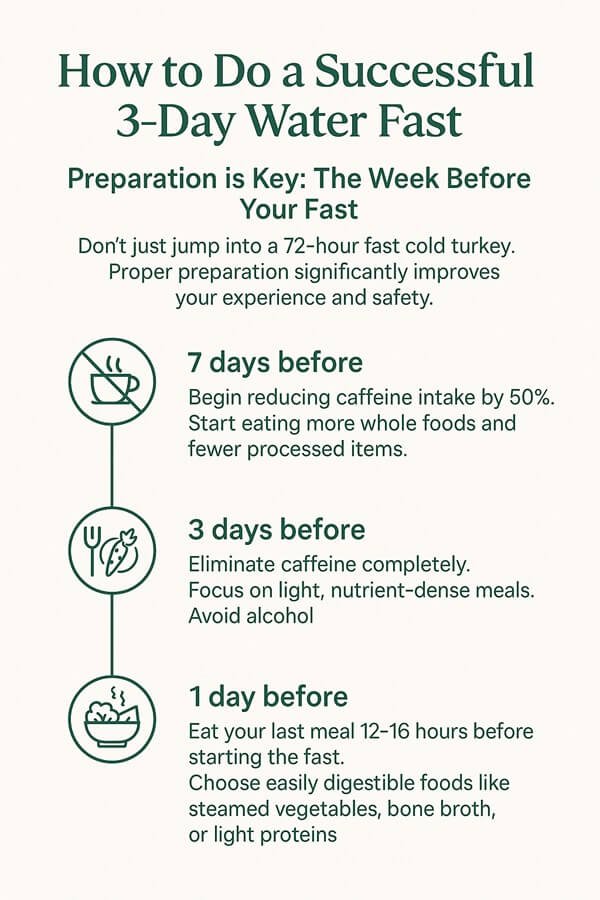
Preparation is Key: The Week Before Your Fast
Don’t just jump into a 72-hour fast cold turkey. Proper preparation significantly improves your experience and safety.
- 7 days before: Begin reducing caffeine intake by 50%. Start eating more whole foods and fewer processed items.
- 3 days before: Eliminate caffeine completely. Focus on light, nutrient-dense meals. Avoid alcohol.
- 1 day before: Eat your last meal 12-16 hours before starting the fast. Choose easily digestible foods like steamed vegetables, bone broth, or light proteins.
During the Fast: Tips for Each Day
- Day 1: The Initial Challenge Expect hunger waves every 3-4 hours. These typically last 15-30 minutes and then pass. Stay hydrated and keep busy with light activities. Avoid intense exercise.
- Day 2: Entering the Fasting Zone Energy levels often drop significantly. This is normal as your body transitions to ketosis. Rest more, drink your electrolyte solution, and be patient with the process.
- Day 3: The Final Stretch Many people report renewed energy and mental clarity by day 3. However, don’t push your limits. If you feel unwell at any point, break the fast immediately.
How to Break Your Fast Safely
This might be more important than the fast itself. Refeeding syndrome = a potentially dangerous shift in electrolytes and fluids that can occur when food is reintroduced too quickly after prolonged fasting [13].
- Hour 1-2 post-fast: Start with 4-6 ounces of diluted bone broth or vegetable broth. Wait 2 hours before consuming anything else.
- Hours 3-6: Add small amounts of easily digestible foods like steamed vegetables, fermented foods, or a small serving of healthy fats (avocado, olive oil).
- Day 2 post-fast: Gradually increase portion sizes. Focus on whole foods and avoid processed items, sugar, and large meals.
- Day 3 post-fast: You can usually return to normal eating patterns, but continue emphasizing nutrient-dense whole foods.
Foods to avoid immediately after fasting:
- Large meals
- High-sugar foods
- Processed foods
- Excessive carbohydrates
- Alcohol
Frequently Asked Questions
Final Take
The research reveals both compelling benefits and real risks associated with 72-hour water fasting. While studies show promising effects on cellular repair, metabolic health, and inflammation markers, these benefits must be weighed against potential complications and the fact that most advantages appear temporary without lasting lifestyle changes.
The bottom line? A 3-day water fast isn’t a magic bullet, but it may serve as a powerful reset tool for some people when done safely and with proper preparation. The key lies in honest self-assessment, adequate preparation, and most importantly, medical consultation before beginning.
“But is it actually worth the discomfort and risks?” – you might ask.
The answer depends entirely on your individual health status, goals, and ability to fast safely. For many people, the insights gained about their relationship with food and hunger may prove as valuable as any metabolic benefits.
Remember that the most sustainable health improvements come from consistent, long-term lifestyle changes rather than short-term interventions. Whether or not you choose to try water fasting, focusing on whole foods, regular movement, and stress management will always form the foundation of lasting health.
References
- [1] National Center for Biotechnology Information – “Efficacy and safety of prolonged water fasting: a narrative review” – June 27, 2023
- [2] MIT News – “Study reveals the benefits and downside of fasting” – August 21, 2024
- [3] MIT News – “Study reveals the benefits and downside of fasting” – August 21, 2024
- [4] National Center for Biotechnology Information – “Efficacy and safety of prolonged water fasting: a narrative review” – June 27, 2023
- [5] Queen Mary University of London – “Fasting for three days can trigger weight loss but seven is too much” – March 4, 2024
- [6] National Center for Biotechnology Information – “Enhanced therapeutic efficacy in cancer patients by short-term fasting: the autophagy connection” – 2016
- [7] National Center for Biotechnology Information – “Efficacy and safety of prolonged water fasting: a narrative review” – June 27, 2023
- [8] National Center for Biotechnology Information – “Efficacy and safety of prolonged water fasting: a narrative review” – June 27, 2023
- [9] National Center for Biotechnology Information – “Effects of intermittent fasting on brain metabolism” – 2022
- [10] MIT News – “Study reveals the benefits and downside of fasting” – August 21, 2024
- [11] PMC – Fasting enhances growth hormone secretion and amplifies the complex rhythms of growth hormone secretion in man – April, 1988
- [12] Nutrients – The Effects of Prolonged Water-Only Fasting and Refeeding on Markers of Cardiometabolic Risk – March 11, 2022
- [13] Cleveland Clinic – “Refeeding Syndrome: Symptoms, Treatment & Risk Factors” – 2024

How often can you do a three day fast?
Truth is, there’s no established safe frequency for 3-day water fasts – the research just isn’t clear on this.
Here’s what holistic health experts typically suggest:
Beginners: Start with weekly 1-day fasts, then work up to a 3-day fast once every three months.
Experienced fasters: Can often handle monthly 3-day fasts.
Important: If you have any medical conditions, only fast under professional supervision.
The bottom line? Your individual health matters more than any generic schedule. Start slow and listen to your body.